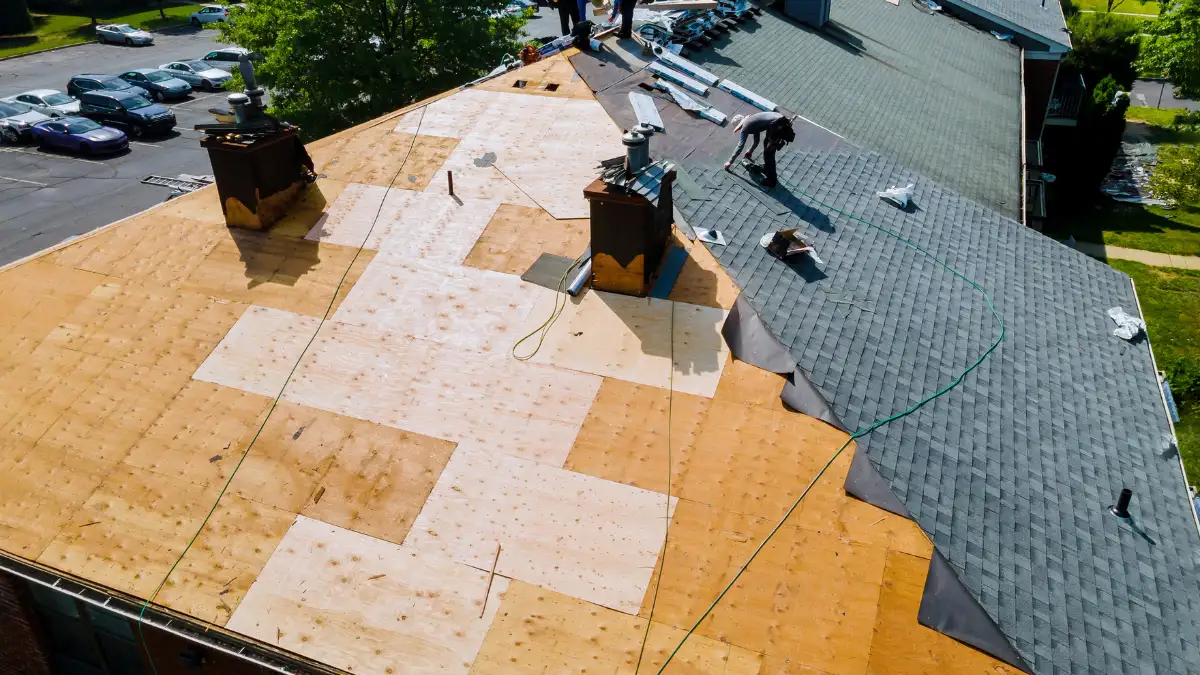When it comes to home improvements, homeowners often wonder if a new roof adds value to their home. The condition of a roof plays a crucial role in a property’s overall value and appeal. A well-maintained roof protects the house from weather damage and enhances its curb appeal, making it an important factor for potential buyers.
This article explores how a new roof impacts home value and when to consider a roof replacement before selling. It also discusses the additional benefits of installing a new roof and provides tips to maximize its value. Readers will gain insights into roofing materials, maintenance practices, and the importance of professional inspections in preserving their home’s worth.
The Impact of a New Roof on Home Value
A new roof has a significant impact on home value, offering both financial and practical benefits to homeowners. While the exact increase in value can vary, a new roof generally provides a solid return on investment and enhances a property’s overall appeal.
Average increase in home value
The average increase in home value due to a new roof typically ranges from 60% to 85% of the initial investment. This means homeowners can expect to recoup a substantial portion of their roofing costs when selling their property. For instance, if a homeowner spends $22,636 on a new asphalt shingle roof, they might see an increase in home value of around $15,427, which represents a 68% return on investment.
Factors affecting the value increase
Several factors influence the value increase associated with a new roof. The condition of the existing roof plays a crucial role. A roof that is nearing the end of its lifespan or has visible damage will significantly decrease a home’s value. Replacing such a roof can lead to a more substantial boost in property worth.
Local market conditions also affect the value increase. In regions with harsh weather, such as New England, a new roof may be a more significant selling point compared to areas with milder climates. Additionally, the overall condition of the home and the expectations of potential buyers in the neighborhood contribute to the impact on value.
ROI of different roofing materials
The return on investment varies depending on the roofing material chosen. Asphalt shingles, being the most common and affordable option, typically offer an ROI of around 60-70%. Metal roofs, while more expensive upfront, can provide a higher ROI of up to 85.9% due to their durability and energy efficiency. Premium materials like slate or copper can offer impressive returns, sometimes reaching up to 85-86%, thanks to their longevity and esthetic appeal.
Free Roof Inspections. Fast. Reliable.
Is your roof ready to weather the storm? Dont risk property damage. Our free roof inspections provide expert analysis to identify potential issues before they become costly problems.
When to Consider a Roof Replacement Before Selling
Age and condition of the current roof
The age and condition of the current roof play a crucial role in determining whether a replacement is necessary before selling. All roofs have a finite lifespan, so knowing the age of the roof can save homeowners time and money in the future. If the roof is nearing the end of its expected lifespan or shows visible signs of damage, it may be worth considering a replacement. Different roofing materials have varying lifespans, with some lasting longer than others. For example, foam roofs can last over 50 years with regular maintenance, while tile roofs typically need replacement after about 25 years.
Local real estate market trends
Local market conditions have a significant impact on the decision to replace a roof before selling. In a competitive seller’s market with high demand and low inventory, homeowners may have more flexibility to sell their property as-is. However, in a buyer’s market with many available properties, a new roof can make a home stand out and justify a higher asking price. It’s essential to consider the potential return on investment for a roof replacement in the local market.
Buyer expectations in your area
Understanding buyer expectations in the area is crucial when deciding whether to replace a roof before selling. In some neighborhoods, buyers may have higher expectations regarding a home’s condition, including the roof. A new roof can be a powerful marketing tool, attracting buyers who prefer move-in ready homes. Many buyers, especially first-time homeowners, may not have the financial means to handle large expenses like a roof replacement after purchasing a property. Additionally, a new roof can improve a home’s curb appeal, which is critical in creating a positive first impression for potential buyers.
Additional Benefits of a New Roof
Improved energy efficiency
A new roof can significantly enhance a home’s energy efficiency. Modern roofing materials and technologies are designed to regulate indoor temperatures more effectively, reducing the strain on heating and cooling systems. For instance, cool roofing materials reflect more sunlight, helping to lower cooling costs during hot weather. Proper insulation and sealing during a roof replacement also contribute to better energy efficiency by preventing conditioned air from escaping. This improved insulation helps maintain consistent indoor temperatures, reducing the need for constant heating or air conditioning. Homeowners can expect to see a decrease in their monthly utility bills after installing an energy-efficient roof.
Enhanced curb appeal
A new roof has a substantial impact on a home’s curb appeal. As one of the most visible exterior features, the roof plays a crucial role in creating a positive first impression. A well-maintained, esthetically pleasing roof can elevate the overall appearance of a property. Modern roofing materials come in various styles and colors, allowing homeowners to choose options that complement their home’s architecture and personal preferences. This enhanced curb appeal can be particularly beneficial for those looking to sell their homes, as it can attract potential buyers and potentially increase the property’s value.
Potential insurance premium reductions
Installing a new roof can lead to potential reductions in home insurance premiums. Insurance companies often view a new roof as an asset that reduces the risk of damage claims. Typically, insurers may offer discounts for homes with new roofs, as they are less likely to suffer from leaks or weather-related damage. The extent of these discounts can vary, but some homeowners may see premium reductions of up to 20 percent. It’s advisable to check with the insurance provider to determine the specific discounts available for roof replacements or upgrades.
How to Maximize the Value of a New Roof
Choosing the right roofing material
To maximize the value of a new roof, selecting the appropriate roofing material is crucial. Asphalt shingles remain a popular choice due to their affordability and durability. However, metal roofs, while more expensive initially, can provide a higher return on investment due to their longevity and energy efficiency. For those seeking a luxurious option, the Tesla Solar roof offers an all-in-one solution that can significantly boost home value by reducing reliance on the power grid.
Hiring a reputable contractor
Selecting a trustworthy roofing contractor has a significant impact on the roof’s value. Local contractors are often preferable as they understand local building codes and can be easily reached if issues arise. It’s advisable to get quotes from at least three contractors and compare their pricing and services. When evaluating potential contractors, consider factors such as proper licensing, insurance coverage, and positive customer reviews.
Obtaining warranties and certifications
Securing comprehensive warranties and certifications can greatly enhance a new roof’s value. Manufacturer warranties typically cover material defects, while workmanship warranties protect against installation errors. Extended warranties offer additional coverage and can be transferred to new owners, making them attractive to potential buyers. Roof certifications, provided by qualified inspectors, offer an objective assessment of the roof’s condition and can increase a property’s marketability.
Conclusion
A new roof is a significant investment that can have a substantial impact on a home’s value and appeal. By boosting energy efficiency, enhancing curb appeal, and potentially lowering insurance premiums, a well-chosen and properly installed roof can provide homeowners with both immediate and long-term benefits. The decision to replace a roof before selling depends on various factors, including its current condition, local market trends, and buyer expectations in the area.
To make the most of a new roof, homeowners should carefully consider their choice of materials, hire a reputable contractor, and secure comprehensive warranties and certifications. These steps not only maximize the value of the investment but also provide peace of mind to current and future owners. In the end, a new roof is more than just a protective covering – it’s a smart way to boost a home’s worth and make it stand out in the real estate market.



